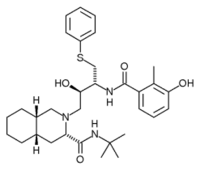Nelfinavir is supplied in light blue, film-coated, Capsule-shaped tablets imprinted with "VIRACEPT" on one side and "250 mg" on the other. Nelfinavir is also available in an oral powder.
"We don't care about Merck's market share."
--spokesperson for ACT UP, demanding the addition of Viracept to the HIV formulary in Pennyslvania, home to Merck & Co., maker of Crixivan
"Agouron hopes to capitalize on its good relations with AIDS activists, who play a major role in influencing patients' treatment decisions."
--The Wall Street Journal, on Agouron marketing strategy for Viracept, the most widely prescribed protease inhibitor in the United States
Also known as: nelfinavir mesylate, NFV, AG-1343
Background and description. Nelfinavir is a protease inhibitor. Nelfinavir is indicated, in combination with other antiretrovirals, for the treatment of HIV infection. The US Food and Drug Administration (FDA) approved nelfinavir in March 1997. The FDA gave approval to a film-coated nelfinavir tablet (for ease of administration) in March 2000.
Guidelines classification. The Panel on Clinical Practices for the Treatment of HIV Infection classifies nelfinavir as a "strongly recommended" protease inhibitor.
Dose. The recommended dose of nelfinavir is 1250 mg (5 tablets) twice a day or 750 mg (3 tablets) 3 times a day.
Food restrictions. Nelfinavir must be taken with a meal or light snack. In clinical study, nelfinavir was administered with meals containing 517 to 759 calories, of which 153 to 313 calories were derived from fat.
Storage. Nelfinavir tablets should be stored in a closed container and kept at a temperature of (59 [degrees] to 86 [degrees] F) and protected from moisture.
Side effects and toxicity. The most frequent side effect associated with nelfinavir therapy is diarrhea, with moderate or severe diarrhea occurring in up to 20% of those taking the drug. Metabolic (lipid and glucose) and morphologic (fat accumulation and fat atrophy) abnormalities have been associated with protease inhibitors in general.
Drug interactions. The following drugs are contraindicated with nelfinavir: simvastatin (Zocor), lovastatin (Mevacor), rifampin (Rifadin, Rimactane), cisapride (Propulsid), midazolam (Versed), triazolam (Halcion), dihydroergotamine (DHE 45) and ergotamine (Cafergot). When administered concomitantly, the dose of rifabutin (Mycobutin) should be reduced to 150 mg once daily and the dose of nelfinavir increased to 1000 mg 3 times daily. Since nelfinavir decreases the level of oral contraceptives when the two are co-administered, an additional or alternative method of birth control should be used.
Resistance and cross-resistance. Mutations at positions 30, 77 and 80 are associated with resistance to nelfinavir. Nelfinavir-resistant virus may retain sensitivity to other protease inhibitors; however, virus resistant to other protease inhibitors is likely to exhibit resistance to nelfinavir as well. As a result patients who experience virologic rebound on nelfinavir may have a better response to second-line therapy than patients who fail other protease inhibitors; however patients must switch therapies shortly after nelfinavir failure to achieve success with other protease inhibitors. There are clinical data suggesting that the duration of the viral suppression afforded by nelfinavir is less than that afforded by other protease inhibitors. Some commentators have suggested that nelfinavir's recommendation by the Panel on Clinical Practices for the Treatment of HIV Infection should be downgraded from a "strongly recommended" to an "alternative" drug choice.
Clinical data. Agouron 511 compared a combination of nelfinavir/zidovudine(Retrovir)/lamivudine (Epivir) against a 2-drug combination of zidovudine/ lamivudine in antiretroviral naive patients. After 1 year, 52% of the patients in the nelfinavir arm had viral loads less than 400 copies/mL (by an intent-to-treat analysis). The mean increase in CD4 T cell count was approximately 200 cells/[mm.sup.3].
Patient assistance. Agouron Pharmaceuticals provides a patient assistance program. For more information, call 888.777.6637.
COPYRIGHT 2000 The Center for AIDS: Hope & Remembrance Project
COPYRIGHT 2000 Gale Group



